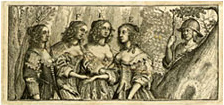Samuel Rid, The Art of Juggling or Legerdemain (1612)
Full Text
EEBO/TCP
Date
1612
Author
S. R. (alternate name for Samuel Rid )
Book title
The Art of Iugling or Legerdemaine Wherein is deciphered, all the conueyances of Legerdemaine and Iugling, how they are effected, & wherin they chiefly consist. Cautions to beware of cheating at cardes and dice. The detection of the beggerly art of alcumistry. &, the foppery of foolish cousoning charmes. All tending to mirth and recreation, especially for those that desire to haue the insight and priuate practise thereof
Publication place
London
Publisher
T. B. and Samuel Rand
Transcription source
EEBO/TCP (Folger Shakespeare Library)
Text type
printed book
Genre
Hard-word, term-of-art, and dialect dictionaries, glossaries, and definitions
Subject area
magic
Summary
Juggling vocabulary
Language
headwords: English
explanations: English
explanations: English
explanations: English
explanations: English
Word-group
type: alphabetical
Word-entry
type: headword
sample: First, you must know a Langret, which is a die that simple men haue seldom heard of, but often seene to their cost, and this is a well fauoured die, and seemeth good and square, yet is it forged longer, vppon the Cater, and Trea, then any other way: And therefore it is called a Langret. Such be also cal'd bard Cater treas, because commonly, the longe end will of his owne sway drawe downewarde, and turne vp to the eie, Sice, Sincke, Deuce or Ace. The principall vse of them is at Nouum, for so longe can ye not cast fiue, nor nine, vnles it be by greate chance, that the roughnes of the table, or some other stoppe force them to stay, and runne against their kinde: for without Cater or trey you know that fiue or nine can neuer come.
sample: First, you must know a Langret, which is a die that simple men haue seldom heard of, but often seene to their cost, and this is a well fauoured die, and seemeth good and square, yet is it forged longer, vppon the Cater, and Trea, then any other way: And therefore it is called a Langret. Such be also cal'd bard Cater treas, because commonly, the longe end will of his owne sway drawe downewarde, and turne vp to the eie, Sice, Sincke, Deuce or Ace. The principall vse of them is at Nouum, for so longe can ye not cast fiue, nor nine, vnles it be by greate chance, that the roughnes of the table, or some other stoppe force them to stay, and runne against their kinde: for without Cater or trey you know that fiue or nine can neuer come.
STC
21027
Other editions
1614: STC 21028




